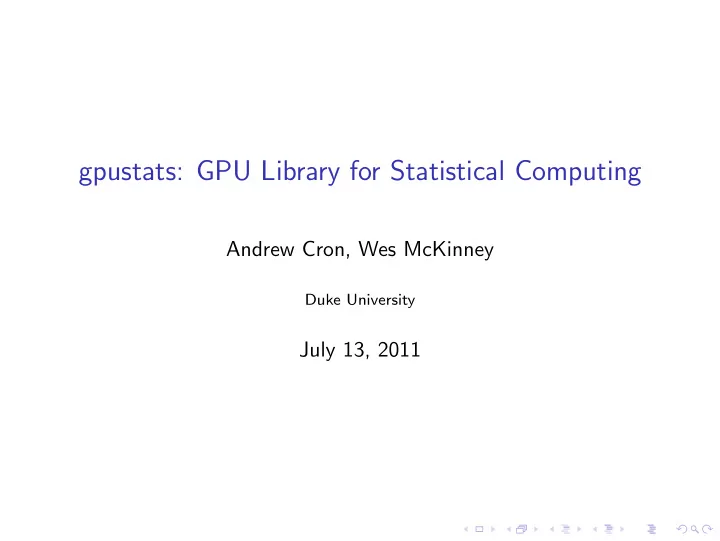

gpustats: GPU Library for Statistical Computing Andrew Cron, Wes McKinney Duke University July 13, 2011
Why GPUs? GPU Programming GPU Computing in Likelihood Based Inference Benchmarks Immediate Impacts in Python: PyMC Future Work
Why GPUs?
GPU Programming ◮ C/C++ General Purpose GPU Computing ◮ Nvidia: CUDA ◮ Kronos: OpenCL ◮ Python GPU Computing ◮ PyCUDA ◮ PyOpenCL gpustats currently depends on PyCUDA (since CUDA had “first mover advantage”), but most ideas apply to PyOpenCL.
SIMD Development Challenges GPUs operate under the Single Instruction Multiple Data framework: ◮ Each thread performs the same instruction on different data. ◮ Threads are organized into blocks with some shared cache memory. ◮ Threads operate in groups that run instruction in lockstep. If the threads diverge, they are executed serially.
GPU Computing in Likelihood Based Inference Many statistical models assume data, x i , arise independently from some distribution p ( x i | Θ) . Where Θ are the parameters of interest. Monte Carlo algorithms (and others) often require evaluating n � log L (Θ | X ) = log p ( x i | Θ) i =1 for many values of Θ . If n is large, this is very expensive, but embarrassingly parallel.
Common/Repetitive Issues in GPU Computing For optimal performance, GPU developers must carefully design their thread instruction designs to take advantage of the memory architecture: ◮ Coalescing transactions between global (slow) and shared memory (fast). ◮ Avoiding shared memory bank conflicts . Furthermore, there is an abundance of boiler plate code for memory copies, thread grid design optimization, and kernel launches that do not change across various pdf implementation.
Metaprogramming to eliminate boilerplate code The difference between implementing the normal logged pdf and the gamma logged pdf is literally just a couple lines the kernel: float log_normal_pdf(float* x, float* params) { float std = params[1]; float xstd = (*x - params[0]) / std; return - (xstd * xstd) / 2 - 0.5 * LOG_2_PI - log(std); } Hopefully, this is all we’d have to write. Since PyCUDA compiles code on the fly, we can use string templates to dynamically generate CUDA code.
Metaprogramming to eliminate boilerplate code Step 1: Write “unnamed” inline CUDA device function implementing the PDF logic: _log_pdf_normal = """ __device__ float %(name)s(float* x, float* params) { // mean stored in params[0] float std = params[1]; // standardize float xstd = (*x - params[0]) / std; return - (xstd * xstd) / 2 - 0.5f * LOG_2_PI - log(std); } """
Metaprogramming to eliminate boilerplate code Step 2: Pass that inline function to the code generation class: log_pdf_normal = DensityKernel(’log_pdf_normal’, _log_pdf_normal) pdf_normal = Exp(’pdf_normal’, log_pdf_normal) Note , the Exp class uses some metaprogramming trickery to apply an elementwise transformation to an existing kernel: class Exp(Flop): op = ’expf’
Metaprogramming to eliminate boilerplate code Step 3: Write Python interface function (could always do more metaprogramming here) def normpdf_multi(x, means, std, logged=True): if logged: cu_func = mod.get_function(’log_pdf_normal’) else: cu_func = mod.get_function(’pdf_normal’) packed_params = np.c_[means, std] return _univariate_pdf_call(cu_func, x, packed_params)
Benchmarks ◮ Comparisons were made on a NVIDIA GTS 250 (128 CUDA cores) and an Intel Core i7 930. ◮ Comparisons are made with and without reallocated GPUArrays. ◮ Several sizes of density values are considered with both single and multiple parameter values.
Benchmarks 1e3 1e4 1e5 1e6 Single 0.22 1.27 7.95 23.05 Single (GPUArray) 0.24 1.29 9.36 38.72 Multi 1.46 7.04 26.19 43.73 Multi (GPUArray) 1.79 8.35 30.79 49.26 Table: Univariate Normal PDF Speedup 1e3 1e4 1e5 1e6 Single 0.70 4.17 12.55 14.09 Single (GPUArray) 0.85 6.03 32.59 64.12 Multi 3.13 18.41 60.18 63.89 Multi (GPUArray) 3.14 19.80 74.39 82.00 Table: Multivariate Normal PDF Speedup
Immediate Impacts in Python: PyMC ◮ The PyMC package allows users to specify complex Bayesian models and does MCMC integration for inference. ( Similar to WinBUGS/OpenBUGS/JAGS. ) ◮ Each iteration of the sample involves an evaluation of the likelihood. If the data is large, this becomes infeasible. ◮ PyMC allows users to use custom likelihood s! Using our GPU bases likelihood could make PyMC more practical for much larger data sets.
Future Work ◮ Use PyOpenCL for ATI cards and CPUs. ◮ Seamlessly use multiple GPUs. ◮ Reimplement the probability distributions in scipy.stats (densities, cumulative distribution functions, and samplers). This will allow seamless integration with most statistics packages.
Thanks! Questions?
Recommend
More recommend